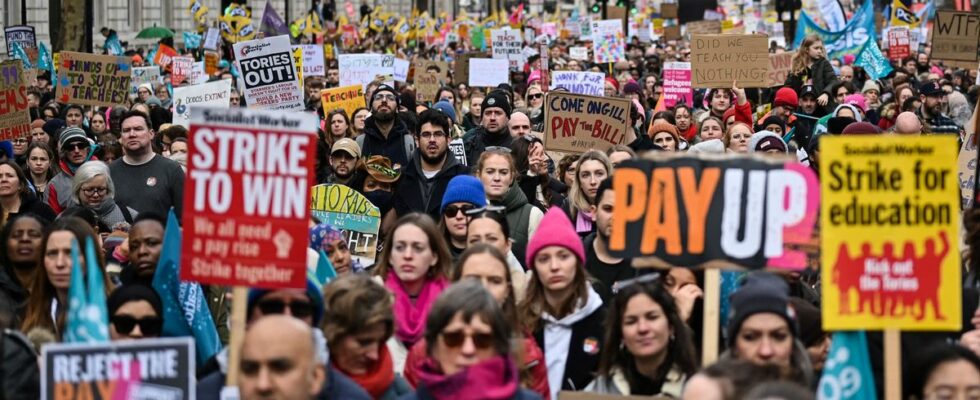Across the Channel, the inhabitants did not take off, strangled by soaring prices. This Wednesday, hundreds of thousands of teachers, railway workers and public officials are mobilized in London for the biggest day of strikes in a decade in the United Kingdom.
In the aftermath of a day of protests in France against pension reform and on the eve of Conservative Prime Minister Rishi Sunak’s first 100 days in power, up to half a million Britons were called to walk out to demand better wages. .
Applause and horns of support
The TUC trade union federation warned that it would be “the biggest day of strikes since 2011”, with, for the first time in several months of social movements, the participation of teachers. Several thousand schools are closed. At the end of the morning, thousands of teachers converged in central London, after holding pickets across the capital. “Pay Up”, “School just wanna have funds”, “Save our schools”, can be read on the banners brandished in the crowd.
On the way to the rally, the strikers were massively supported, applauded and honked by passers-by, motorists and bus drivers who passed them. “I need more money,” said Ciara O’Sullivan, a 38-year-old teacher at the London Screen Academy. She has “great difficulty paying her rent” and her job is “very stressful”, she says.
The Minister of Education “disappointed”
In front of an employment agency, Graham, also a striker, is indignant that some agents “have to go to food banks” to feed themselves. Tony, a 61-year-old train driver, met by AFP near London Bridge station, believes that the government’s refusal to raise wages in line with inflation is “a slap in the face”, especially after the pandemic where rail employees continued to work.
Several parent-teacher organizations have issued a joint statement in which they say they “support” the movement. “They need good wages and good working conditions if we want our children to have a good education,” said Danny Manion, 43, who came with her two children to support teachers on a picket line. Education Minister Gillian Keegan said she was “disappointed” and “very worried” about this movement.
Salaries in line with inflation
“We said we will study future salaries, we will look at the workload and the flexibility that teachers ask for”, as well as recruitment problems, she defended on Sky News. The movement has been going on since the spring. Since last June, 1.6 million working days have been “lost”, according to the National Statistics Office. In all sectors, strikers are demanding wages in line with inflation, which has exceeded 10% for months, pushing millions of Britons into poverty.
And according to the latest forecasts from the International Monetary Fund (IMF), the country should be the only major economy to suffer a recession this year. The standoff also relates to working conditions, pensions or the government’s desire to limit the right to strike. If hopes for progress are perceptible in the rail, a new walkout is scheduled for Friday, while firefighters voted in favor of a first strike in twenty years. Nurses and paramedics will also strike again in February.
Have “a magic wand”
“I really would like nothing so much (…) as having a magic wand and paying you all more,” Prime Minister Rishi Sunak assured Monday during a visit to workers in the health sector. But according to him, wage increases would fuel inflation and further damage public finances. After 100 days in power, the conservative leader finds himself struggling, firm in the face of social movements supported by public opinion and criticized on the integrity of his majority after a series of cases that recall the scandals of the era. Boris Johnson.
In Parliament’s question and answer session on Wednesday, opposition Labor leader Keir Starmer challenged him on the tax disputes that led to the Conservative Party leader’s sacking on Sunday or on accusations of harassment against the Minister of Justice.

